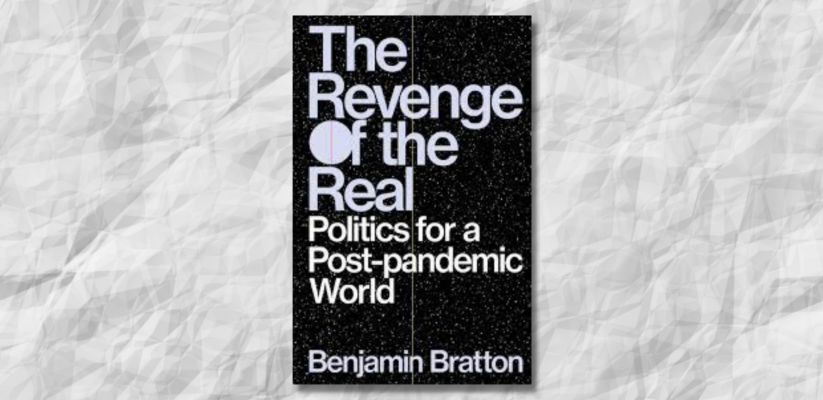Author: Dr Sara Raimondi
Who is more important, you or everyone else? How do we move forward when individuals’ rights (or even perceptions of rights) clash with what’s best for the group? These are classical debates of philosophy, stretching back as far as we have records of philosophers philosophising. The Covid-19 pandemic revealed all-too-clearly how these theorical trolley problems impacted on us all. Could there be better ways forward, based on the concepts of ‘positive biopolitics’; the idea that societies’ health and wellbeing should govern political decision-making?

Here at the University of Westminster, the Centre for the Study of Democracy hosts a regular Materialisms Reading Group. In our last meeting, introduced by Dr Sara Raimondi, we discussed The Revenge of the Real. Politics for a Post-Pandemic World (Verso Books, 2021).
There were a number of heated points and questions that were addressed in the group discussion. The exchanges in the meeting reflected on the critical target of the book: Bratton questions first a range of intellectuals (such as the Italian philosopher Giorgio Agamben) who released controversial comments at the beginning of the Covid-19 pandemic about the perceived draconian character of the measures initially taken by governments. Bratton also targets the latest waves of a populist politics and governments, who have been seen as responsible of mismanaging the current health crisis across many countries and revealing their political incompetence.
This critical part of the book, and major prompt for group discussions of the deeper implications of Bratton’s analysis was his critique of ‘the sovereignty of individual subjectivity’ (p.64), which has produced an over-individualisation where individual opinions and perceptions, and not the collective good, are used to decide what counts as right. Bratton takes issues with an atomised model of society that, in his argument, is incompatible with a ‘planetary society’ that puts not only humans, but also nature and the environment at the centre of consideration. Bratton advocates a new society that deliberately imagines itself ‘with compassion and reason’ (p.5) in order to produce more sustainable futures.
There was controversy on the way the meaning that ‘reason’ has in Bratton’s book: while the author himself uses this term in advocating a post-pandemic politics that is ‘inclusive, materialist, restorative, rationalist’ (p.2), it appeared clear in the discussion that Bratton criticises the idea that human reason only can devise solutions to the most pressing global problems of our time – be they the impending climate crisis, the reduction of biodiversity and species extinction or indeed, a global pandemic. Bratton, rather, suggests a form of ‘collective intelligence’ capable of thinking more competent and sustainable modes of coexistence among species and bonds between the social and the natural, that exist in one continuum.
The group was particularly concerned with the role that data will play in Bratton’s model of ‘positive biopolitics’: the author advocates a society aided by technology through increasingly accurate processes of modelling and sensing and computational solutions. This continues the themes of Bratton’s previous analysis of planetary-scale computation formulated in his much more substantial and voluminous 2016 work The Stack.
The discussion in the meeting also highlighted the (potentially risky) implications of Bratton’s ‘manifesto’: Bratton is not silent around the fact that his project is grounded in a realist form of planetary politics that foregrounds the materiality of the problem over any assumption of a discursively mediated reality. The pandemic, for him, is a ‘social fact’ (p.45) that should inspire new forms of global social mobilisation at planetary level. The very reference to the ‘revenge of the real’ that appears in the title of the book is inspired by the impossibility – which, for him, is made apparent by the event of the Covid-19 pandemic – of denying the profound materiality of the problem at stake: a state of entanglement (biological, chemical, zoological, geological), we are told, ‘is the baseline, not the exception’ (p.2) to understand the condition of human existence on the planet.
However, Bratton’s proposals – the group discussed – may lead to a form of biological determinism where it is now ‘life’ that dictates the norms of social existence. In other words, by distancing itself from traditional forms of governing and modern ideas of reason, Bratton’s positive biopolitics risks foregrounding a way of existing which is dominated by technology and based on the possibility of ever-improved forms of modelling, sensing and composing through the collection and generation of data. The ‘real’ becomes understood in fully datafied and computational forms, and forgets more traditional, analogue forms of conceiving politics and society. While raising these crucial implications, the participants of the reading group recognised the originality and relevance of Bratton’s provocative book for academics and general readers alike.
This article attempts to capture and summarise discussions from the Centre for Study of Democracy’s regular Materialisms Reading Group. Reading group meetings have been running since May 2013, they are open to all and take place Thursdays 6.30-8.00pm, Westminster Forum, Department of Politics and International Relations, 5th Floor, 32-38 Wells Street, London, W1T 3UW (5 minutes from Oxford Circus tube). Information about forthcoming Materialisms Reading Group meetings can be found at the Centre for the Study of Democracy events webpages.
Author’s biography
Dr Sara Raimondi has been a regular attender of the Materialisms Reading Group since its founding in 2013. She is Assistant Professor in Politics and International Relations at the New College of the Humanities, London.
